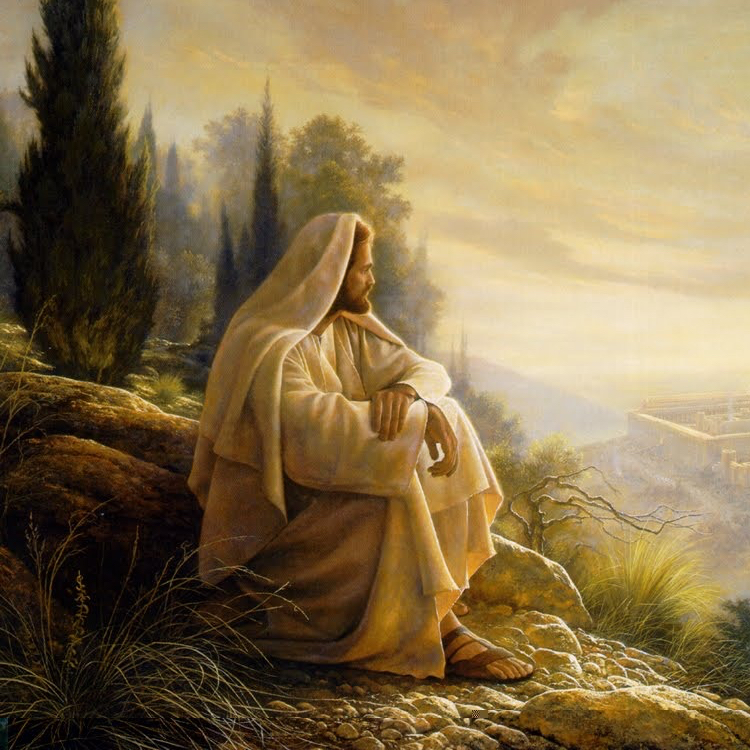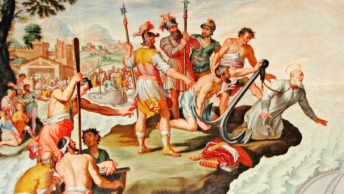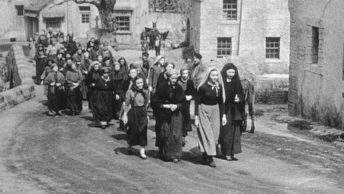On a Sunday morning, in a little chapel near the border between Venezuela and Colombia in South America, Mass had just begun—but the liturgy was interrupted by a group of guerillas, or rebel soldiers, armed with submachine guns. That part of the world is torn by violence between governments, resistance fighters, and drug dealers, some of whom are violently opposed to religion—so it was very frightening, but not surprising, when these armed men suddenly appeared out of the jungle and barged into the chapel. At the order of their leader, two of the men dragged the priest outside, apparently to be executed. Then the leader demanded, “Anyone else who believes in this God stuff, stand up!” The congregation was frozen in fear, and a long silence followed. Finally one man stood up, walked up to the leader, and announced quietly, “I love Jesus.” He was roughly dragged outside, as were a few other parishioners who dared to stand up. Then, following the sound of machine gun fire outside, the guerilla leader shouted at the rest of the congregation, “Get out! You have no right to be here!” The people were herded outdoors, where, to their shock, they saw their pastor and those who were willing to die for Christ standing there, unharmed. The leader told them, “Go back inside and finish your Mass,” and then he shouted angrily at the others, “As for you, stay away from here until you have the courage to stand up for your beliefs!” With that, he and his men disappeared back into the jungle (Bausch, More Telling Stories, p. 13).
The method used by the guerilla leader was dramatic and more than a bit manipulative, but his anger at the lukewarm parishioners may have been justified, and his point was certainly a valid one. It is too easy for us as Christians to become lax in our faith, to slack off in our duties—including the heartfelt worship we owe God—and to take the easy way out if our religion involves a sacrifice. There are some things we should cherish so much that we’re willing to draw hostile attention to ourselves, and even make other people angry, in our defense of them. We will never be truly and completely alive unless we’re willing to die for what we believe.
Jesus is the most loving and forgiving person Who ever lived—and yet, some things were capable of infuriating Him. We see in the Gospel of John (2:13-25) that He could not abide having the Temple in Jerusalem serve as a marketplace; zeal for the dignity of His Father’s house caused Him to overturn the merchants’ tables and drive out the animals being sold to pilgrims. Our Lord knew full well that His enemies would use this event as evidence against Him, but He didn’t care; righteousness was more important to Him than calculations of personal benefit or loss. This was an instance of the “foolishness of God,” referred to by St. Paul (1 Cor 1:22-25)—a foolishness wiser than human wisdom. The Book of Exodus (20:1-17) relates how God gave the Ten Commandments to His people, and two of them have particular significance in regard to today’s Gospel. The First Commandment tells us that we must not place anyone or anything before the Lord our God, and the Third Commandment requires us to keep holy the Sabbath day. In other words, we must worship God whole-heartedly, putting Him first in our lives—and one very visible and irreplaceable way of doing this is by attending Mass each weekend.
There’s a story about a man who dreamt that his guardian angel took him to a church one Sunday morning to observe how the congregation worshipped. He saw the organist playing, but heard no music; the choir members and the congregation were singing, but no sound came from their mouths. When the pastor went to the pulpit and began preaching, his lips moved, but there was complete silence in the church. In confusion, the man asked his angel for an explanation, and was told, “This is the way it sounds to us in Heaven. The reason you hear nothing right now is because there is nothing to hear. These people are going through the motions of worship, but their thoughts are on other things, and their hearts are far away from God” (Nelson’s Complete Book of Stories, Illustrations, & Quotes, p. 809). This world is often fooled by outward appearances, but Heaven never is. Because of the Eucharistic Presence of Jesus, a story like this could never happen at a Catholic Mass; if the priest and people were bored, distracted, or even guilty of serious sin and living wicked lives, a validly-said Mass would still be of infinite spiritual value. That, however, is not an excuse for us to give the Lord anything less than our best. Because the Mass was established by Jesus at the Last Supper, it is the most perfect form of worship possible—but we personally benefit from it only to the degree we try to participate with faith, humility, and gratitude.
This means, among other things, obeying the Third Commandment by coming to church each weekend, dressing in a respectful way, being on time for Mass, maintaining a spirit of reverence here in church, listening attentively to the Scripture readings, trying to get at least one useful or worthwhile idea even from a boring homily, contributing to the collection to the degree our finances allow, praying and singing with the rest of the congregation, receiving Holy Communion worthily and never in a state of serious sin, and not leaving Mass early except for a very good reason. These are all very basic things, and yet it’s so easy for us to fall into bad habits, settle for merely going through the motions, or take our Catholic faith for granted.
Throughout the history of the Church, countless Christians have been harassed, persecuted, exiled, imprisoned, or even executed because they angered the enemies of God by taking their faith seriously. The Lord doesn’t want us to become angry at those who hate and persecute the Church, and He certainly doesn’t want us to resort to hatred or violence—but He does want us to be so fiercely committed to Him that we’ll pay whatever price is needed to obey His commandments. As Jesus once said, those who cling to their lives will lose them, while those who surrender their lives for His sake will live eternally. He Himself is the true Temple of God which can never be destroyed, and only by uniting ourselves to Him can we be truly free, truly happy, and truly alive.








